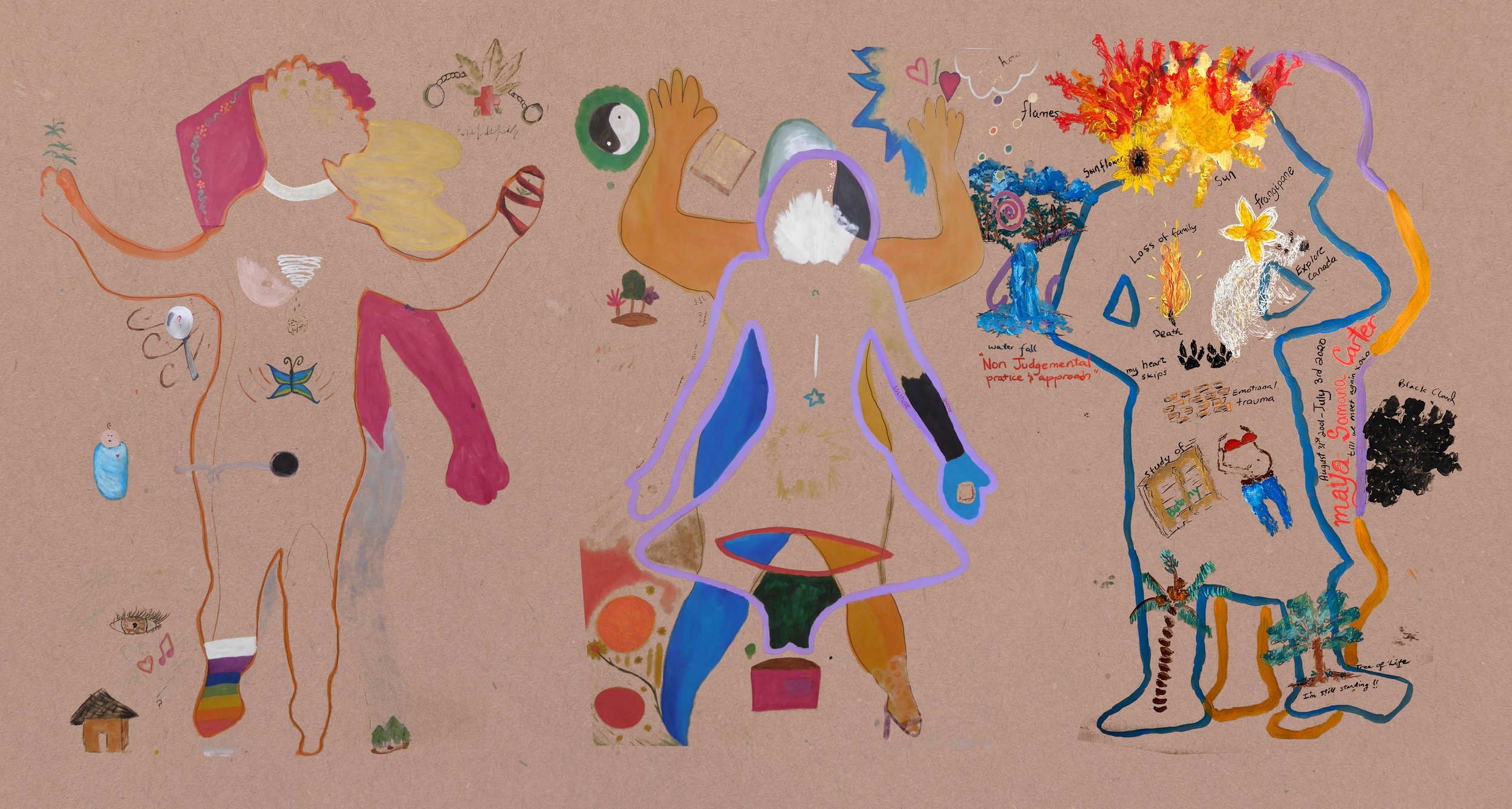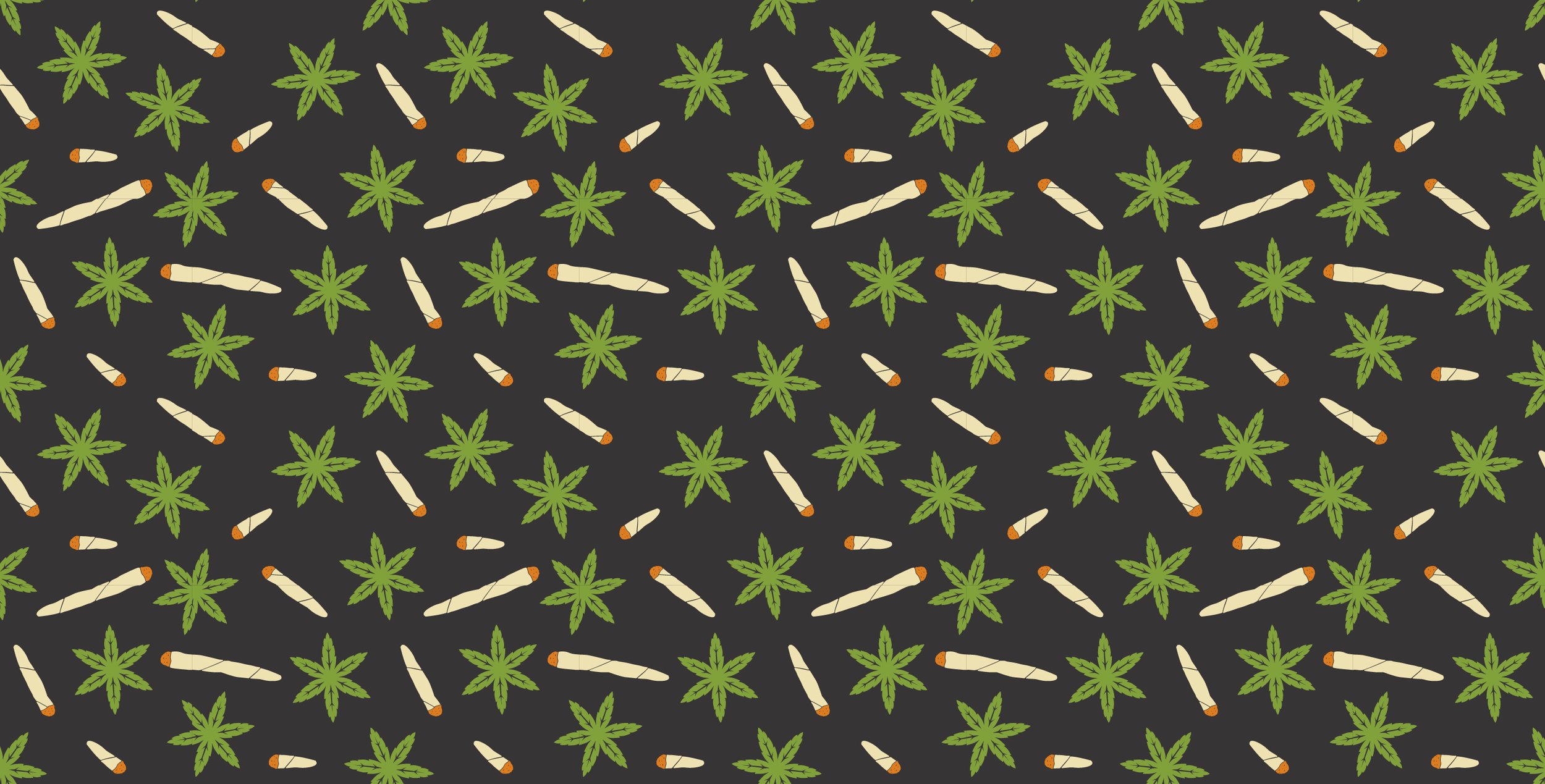
Supporting Women Who Consume in Ways that Work
Wading through the Weeds is an on-going research project aimed to translate and mobilize new knowledge to improve public health approaches to supporting Black, Indigenous and other unjustly marginalized individuals who consume cannabis during pregnancy, breastfeeding, and motherhood. Building on a small body of critical health and social science research, this work aims to centre Mothers’ stories.
Pregnancy, Breastfeeding, and Parenting
Publications
Wading Through The Weeds:
A Public Health Response to Supporting Pregnant and Breast/Chestfeeding People who Consume Cannabis
“Digging in”:
Stigma and surveillance in the lives of pregnant and breastfeeding mothers who consume cannabis
Objectives
The two primary objectives of the Wading through the Weeds Project are:
Garner the experiences of Black, Indigenous, and other unjustly marginalized pregnant and breast/chestfeeding individuals to identify and shape how public health policies and practices can effectively respond to their lived realities; and
Generate new knowledge to strengthen public health and allied health care policies and practices that will increase access to perinatal and parenting information and support for pregnant and breast/chestfeeding individuals who consume cannabis.

“The Flower Brings Me Solace”
Research Participant Artwork
Key Research Questions
Where do pregnant and breast/chest feeding individuals who consume cannabis access public health information before, throughout and following the perinatal period?
How do pregnant and breast/chestfeeding individuals interface with current cannabis policies, practices and regulations?
How do pregnant and breast/chest feeding individuals who consume cannabis envision health and public health cannabis policies and practices that are accessible and supportive?
Background
In 2018, Canada legalized recreational cannabis. This has had significant shifts on the landscape of health and social policy and had implications for health and social care providers. As legalization becomes more entrenched, cannabis related surveillance, stigma and punishment still looms large for marginalized communities. Our project builds on a small body of critical health and social science research that focuses on cannabis use during pregnancy, breastfeeding and the postpartum period.
Cannabis is one of the most widely used substances during pregnancy across Canada
(Corsi et al., 2019a; Corsi et al., 2019b; Krenig & Hanson, 2018; Mets & Stickrath, 2015). Some Canadian studies document up to 5% of pregnant women self-reporting cannabis use (Ryan et al., 2018; Young-Wolff et al., 2019)., Kaarid and colleagues (2021) recent research on the prevalence of cannabis consumption for pregnant women living in urban cities in Canada, found that among the 478 respondents, 54 (11%) reported consuming cannabis at some point during their pregnancy. And yet, studies such as these, that rely on self- reported data are likely to under represent the current reality (Ryan et al., 2018).
Cannabis related stigma and surveillance is shaped and further exacerbated by intersecting identities along axes of Indigeneity, race, socio-economic status, disability, criminalization, child welfare involvement and HIV status.
People who face existing injustice in health and social care settings have concerns about approaching health and social care providers for information, support and education about cannabis consumption during pregnancy, breast/chestfeeding and postpartum.
During the time of cannabis prohibition, Black, Indigenous, and racialized communities have been subjected to greater surveillance and have faced harsher penalties for cannabis consumption and possession (Schlussel, 2017; Vitiello, 2019). Despite legalization, Black and Indigenous mothers continue to experience increased surveillance and unjust consequences because of cannabis use (Boyd, 2019).
The Wading through the Weeds Project seeks to respond to the anti-Black racism that continues to exist in Canadian health and public health policies and practices, and the Truth and Reconciliation Commission: Calls to Action (2015, p. 2-3) to “address gaps in the health, public health policy and healthcare practices between Indigenous and non- Indigenous peoples.”
Research from a gendered and intersectional theoretical lens on cannabis consumption
is limited.
Furthermore, research demonstrating positive health outcomes or perceived improvements in women’s quality of life in relation to cannabis consumption are often not included in the body of “evidence” used to derive guidelines and inform clinical practices
(Kozak, Ion & Greene, 2022).
Currently, multiple public health, obstetric, and pediatric organizations advise against cannabis consumption while pregnant and breastfeeding (Committee on Obstetric Practice, 2017; Health Canada, 2018; Ryan et al., 2018). And yet, there continues to be a lack of conclusive evidence regarding possible adverse effects of cannabis consumption during the perinatal period (Barlett et al., 2020; Jarlenski et al., 2016).
It is acknowledged by researchers that pregnant women who consume cannabis are more likely to be affected by the social determinants known to impact health including racism, colonialism, poverty, mental health challenges, trauma, and other concurrent environmental and social factors (Bartlett et al., 2020; Greene et al., 2016; Ion et al., 2017; Jarlenski et al., 2016).
We echo previous scholars who have noted that cultural, economic, and social factors can shape birth outcomes more broadly and call for an intersectional approach to understanding cannabis consumption during pregnancy, breast/chestfeeding and the postpartum period (Dreher et al., 1994; Nugent, 1994).
There has been a call for increased knowledge at the intersections of gender and cannabis consumption and a need for more research that elucidates how gender roles and relations and identities, intersect with the health and social consequences of cannabis use to “inform more responsible health promotion, effective harm reduction and precise treatment approaches for all genders” (Greaves & Hemsing, 2020, p.11).
The Wading through the Weeds Project offers a critical response to this call by using a participatory arts-based approach to researching with pregnant and breast/chest feeding individuals who consume cannabis across Canada.

“We Don’t Want to Wade Through the Weeds for Actual Factual Information”
Research Participant Artwork
Key Findings
1. Centring Lived Experience:
Currently the majority of research around the intersection of pregnancy, breastfeeding and parenting is from the perspective of public health and health based researchers. The experiences of people who consume cannabis and who occupy marginalized identities are particularly absent from the research.
There is a need for supporting research that centres lived experience throughout the research process. This research must be grounded in anti-oppressive values that acknowledge the histories of racism, colonialism and poverty.
2. Moving Beyond Discourses of Risk vs. Discourses of Resilience:
When research is done around perinatal experiences and cannabis consumption is positioned within discourses of risk, both in terms of public health and social care. What is absent from the current discourse are the perceived and actual benefits of cannabis consumption particularly in the context of mental health and wellbeing.
3. Stigma and Surveillance:
Although cannabis has been legalized in Canada since 2018, people who consume cannabis face stigma, specifically those who have been historically surveilled in health and social care contexts (ie. Black, Indigenous and Poor Women, those Living with HIV and living with mental health concerns).
Discourses of risk perpetuate the stigma and surveillance of marginalized pregnant, breastfeeding and parenting individuals. This occurs in health and social care contexts where these individuals face a high level of surveillance and monitoring of their cannabis consumption.
This leaves people feeling criminalized and in many cases live in fear of having their children apprehended because of cannabis related concerns.
4. Access to Care and Information on Cannabis During Pregnancy, Breastfeeding and Parenting:
The conditions outlined above make it high risk for mothers/parents** to seek out information, education and support from their health and social care providers about cannabis.
Consequently, parents make decisions that are not based on evidence. This is due to a lack of accessible information or availability of partial information, and morally based recommendations made by health and social care professionals; and partially because the consequences associated with reaching out can be punitive.
Participants seek out cannabis and pregnancy information through engaging in self- research, peer connection and virtual communities, and ancestral and traditional knowledge. While these sources of support are important, cannabis related information received can be contradictory and result in raising more questions than answers.
5. Supporting Mothers (and Birthing People) Who Consume in Ways That Work:
The Wading through the Weeds Project centres the perspectives and experiences of people who consume cannabis during the perinatal and postpartum period.
Supporting mothers who consume cannabis during pregnancy, breastfeeding and postpartum through a public health response must be grounded in anti-racist, de-colonial and harm reduction-based philosophies.
1. Identity, experience and culture must be considered when designing responsive frameworks
2. Develop non-punitive support, information and health and social care services with/for people who are pregnant, breastfeeding and/or mothering and consuming cannabis
3. Draw on what is already working including person-centred health-care frameworks (midwifery models of care), peer support and virtual community and culturally grounded approaches to care, information and support.
** All the participants in this study identify as mothers, however, we are including the term parents to ensure inclusivity of all genders who parent, experience pregnancy and infant feeding.

“At the end of the day I need a little fresh air.
Some green flowers are my way of self care.”
Brooklyn Bertozzi,
Research Participant Artwork
Conclusions
INTERPRETATION OF FINDINGS
The Wading through the Weeds Study emphasizes the importance of centering the lived experiences of mothers/parents in cannabis research in order to develop a client centered approach in the development of public health policies, practices and strategies.
Of central importance, our study highlighted the need for de-stigmatizing and harm reduction approaches at the intersection of cannabis education and perinatal care. Developing such models of education, care and support would address barriers that pregnant people and parents experience in connection to decisions they make regarding cannabis consumption. This was underscored by the participant’s resounding agreement for the need for more research on cannabis consumption during pregnancy, infant feeding and parenting.
IMPACT OF FINDINGS
Our project reiterated that participants from marginalized identities including Black and Indigenous parents and parents living with visible and invisible disabilities faced more cannabis related stigma and surveillance. Stigma and surveillance were particularly noted in participants’ interactions with the child welfare system and the health care system.
Fears associated with the above in the context of cannabis consumption during the perinatal period and beyond result isolation and silence. This prevents parents from seeking out health or social care support and having honest conversations about cannabis use during pregnancy and infant feeding with their care providers.
Participants in this study identified the need for more information and education relating to cannabis consumption during the prenatal period to inform their decision making. There is a concern then that current public health strategies (including available information and resources) do not reflect the everyday realities of people who desire or need to consume cannabis during pregnancy, infant feeding and parenthood.

“I’m in a bad place, I’m afraid to call crisis response or to call for help because then automatically... You have kids so they’re going to start opening a CAS thing... like that’s why I painted my black hand over my face, because it’s almost like we want to tell our stories and we want to say our point of view, but like we are so afraid of the consequences of that, that we don’t ask questions, we don’t find answers, we don’t tell our stories. We keep everything inside because we’re so afraid of the consequences.”
Policy Impact
1. Further Develop Harm Reduction-Based Supports During Pregnancy and Postpartum For People Who Consume Cannabis
Our findings brought attention to the lack of perinatal care that is grounded in the histories (political, economic, social and personal) and every-day lived experiences of mothers/ parents who consume cannabis during pregnancy, infant feeding and parenting.
We strongly urge further developing models of public health and social support for people during pregnancy and the postpartum period that is grounded in a harm reduction approach.
2. Co-create Information and Resources Relating to Cannabis and the Perinatal Period
Participants in our study called attention to a lack of accessible information on cannabis consumption during pregnancy and infant feeding.
We encourage the development of new types of educational tools and resources (virtual, arts-based) that provide information on cannabis and pregnancy/infant feeding. We suggest researchers work collaboratively with mothers and parents who use cannabis when designing new resources to ensure resources address the needs identified by mothers who consume cannabis and are widely accessible.
3. Enhance Capacity of Health, Social Care and Child Welfare Workers Who Support People Who Consume Cannabis During Pregnancy and Postpartum
Stigmatizing interactions with health and social care providers emerged throughout the Wading through the Weeds project.
We call for the development of enhanced training and capacity building opportunities for health and social care providers relating to cannabis, pregnancy and parenting grounded in the context of legalization. There is a particular need for education, training and support for child welfare workers who work with people who consume cannabis during pregnancy and parenting.
Training needs to focus on working towards less stigma, surveillance and punitive interactions based on cannabis consumption. Findings from this project and other research that centres lived experience offers important content that could be used as the basis of a training.
4. Support and Care That Works
Participants in our study offered considerable information about what they need to be well supported in relation to cannabis consumption during pregnancy and postpartum.
This includes connection to culture, communities of care for mothers, peer-based support, and trustworthy and reliable care providers. Our findings show that from a public health perspective, there is a lot to be learned from midwifery models of care, centring choice, relational-based support, and trauma-informed approaches.
We encourage the development of new community-based public health and social programs for people who consume cannabis during pregnancy, infant feeding and postpartum.
Research Team
-

Dr. Saara Greene
Principal Investigator
Professor and Graduate Chair
School of Social Work McMaster University -

Dr. Allyson Ion
Lecturer
School of Social Work McMaster University -

Dr. Chelsea Gabel
Associate Professor and Canadian Research Chair in Indigenous Well-Being, Community Engagement and Innovation
Indigenous Studies Program and Department of Health, Aging and Society -

Chaneesa Ryan
Director of Health
Native Women’s Association of Canada -

Marisa Blake
Cannabis Project Coordinator
Native Women’s Association of Canada -

Arbar Ali
past Senior Health Advisor
Native Women’s Association of Canada -

Theresa Kozack
Independent Researcher
-

Gabrielle Griffith
Program Coordinator
2SLGBTQIA - Birthmark Support -

Claudette Cardinal
Peer Indigenous Research Assistant
British Columbia Centre for Excellence in HIV/AIDS -

Alexe Bernier
Research Assistant
McMaster University School of Social Work -

Rochelle Maurice
Research Assistant
McMaster University School of Social Work -

Mary Vaccaro
Research Coordinator
PhD Candidate
McMaster University School of Social Work
Thank You To Our Participants
We want to send a special thank you to all the mothers who chose to participant in this study.
Without their vulnerability in sharing their stories and experiences,
we would not have been able to accomplish any of this.
Thank you to all of you for being so open, authentic and honest about your experiences with Cannabis through pregnancy and feeding your children.












